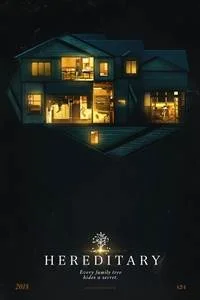Hereditary
Director: Ari Aster
Starring: Toni Collette, Gabriel Byrne, Alex Wolff, and Milly Shapiro
Family…that word holds a unique meaning, it’s a word that comes with a different set of responsibilities depending on how the individual defines it. We all know that one family that loves to be together and we all know that family that needs to call the authorities at Thanksgiving dinner. Whether your immediate household or that distant cousin from your third uncle’s second marriage, family comes with a heap of emotional baggage.
Horror films have utilized this aspect of family, mostly broken beyond repair, to build visions of invasive family structure terror. Think of films like “The Omen”, “The Shining”, or even more recently “The Conjuring”, all have families thrown into chaos because of the supernatural that consumes their peaceful lives. What makes director Ari Aster’s film “Hereditary” different from most is the structure concerning the family dynamic, specifically the historical structure and the ongoing trauma and despair that has permeated the foundation of this family’s ancestry.
Annie’s (Toni Collette) mother, a private and secretive woman, has passed away. While not completely unexpected, grandma’s death brings about some strange occurrences. Annie, struggling with her relationships and the mourning process, begins to discover some strange happenings concerning her family history; aspects that become increasingly sinister and evil as more is revealed about her mother.
Let’s get this out of the way before you read any further, “Hereditary” is disturbing and extremely affecting, a film that cares more about embedding itself in your subconscious mind than simply offering a jump scare, although it has a few of those as well. The less you know about this film the better the experience will be.
This is Ari Aster’s first feature length film. This is simply impressive considering how deftly the director executes the little elements that really make “Hereditary” shine. The technique incorporated into the film editing and photographic design is a blend of ingenious framing devices that hint and wink at scare tactics before playing against type, clever transitions that drastically manipulate tone and atmosphere, and amusing influences to the familiar aspects of contemporary horror design concerning the expectations associated with the setup and payoff. These aspects are demonstrated from the very first scene of the film, a slow push through a window, past a workshop full of miniatures, and into a dollhouse that seamlessly blends into the bedroom of one of the family members.
Mr. Aster does so much work to keep the tension high throughout the film, slowly dragging while at times shoving the viewer forward into the experience. It’s a grueling emotional kidnapping for the viewer who is forced to experience the traumatic relationship between grief and despair that the family is going through. The fear and the scare of it all happens during emotionally devastating moments, when your heart is already being manipulated, the terror is thrown in for a final punch. Ms. Aster handles it with precision.
The sound design makes great use of relatively silent moments by adding small details into the backgrounds or through the voices of the characters. In one scene Annie's son Peter (Alex Wolff) reaches a breaking point, the sounds of terror through the whimpering and moaning of a young man is completely unnerving.
The character design is also fantastic, it’s what helps the narrative achieve an authentic feel amidst its completely bizarre horror touches. Toni Collette is exceptional as Annie, providing one of the best horror movie performances in years. Her movements from despair to lunacy then compassionate to heartlessness are absorbing. It’s another technique that pulls the audience into the darkness embraced by the film. Everyone understands the trauma associated with loss, loneliness, and despair, the film utilizes this to bring aspects of true terror into the mix of the story. These heart wrenching emotions are further embraced by the cast of characters, each of them handles the increasingly threatening situations with their own coping mechanisms. Gabriel Byrne is tasked as the anchor of reason for the family, the stress of holding the family together is palpable because of Mr. Byrne’s solemn steadfastness.
“Hereditary” embodies everything I admire about the genre. Specifically how absolute terror doesn’t need to come at the hands of a stalking monster or a scary entity; instead the fear associated with effective horror tales is always the trauma caused by human emotions. Just think about the film images that stick with you, the moments that linger in your mind late in the evening; the singing man in “The Wicker Man”, the screaming father in “The Mist”, the terrified mother in “Rosemary’s Baby”. Add “Hereditary” to the esteemed list of movies you will be hard pressed to shake.
Monte’s Rating
5.00 out of 5.00










